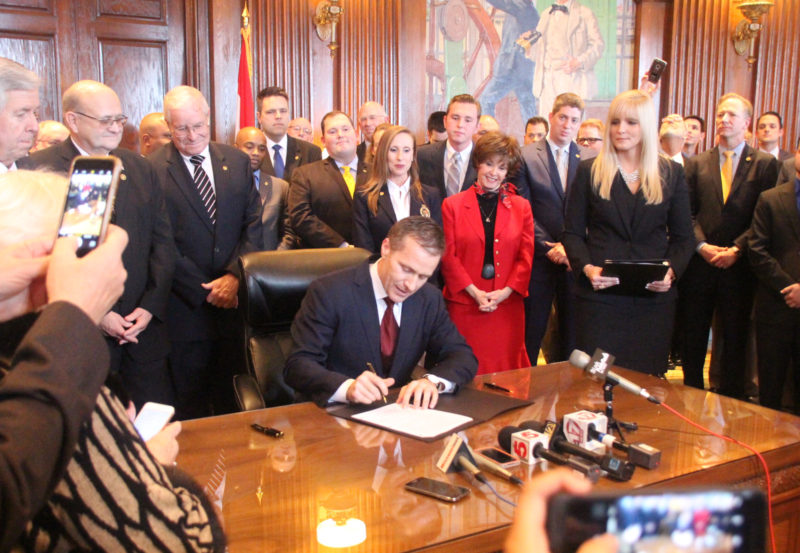Gov. Eric Greitens hinted heavily at his end of session press conference that the Missouri General Assembly will come back for a special session. He gave the legislature an “incomplete” grade in answer to a question of how he would rate his own performance in his first legislative session as governor, and he uttered a boxing truism that can easily be interpreted as a hint to a coming special session.
Yet it remains to be seen what specific issues would drive Greitens to call a special session. As reported last week by The Missouri Times, governors usually call special session for the purpose of bringing immediate economic development or pass important public policy when a strict timeline forces the legislature to act quickly. Special sessions can cost hundreds of thousands of dollars, and can ultimately become ineffective if compromises cannot be reached on certain bills.
Even if Greitens simply desires to pass through some important pieces of public policy, major pieces of legislation he specifically asked for currently sit on his desk. Blue Alert legislation made it into an omnibus crimes bill, REAL ID made it through the Senate and back through the House, despite protests from some members of his own party, and he will even have a chance to sign a bill to settle once and for all the long debate over the official state dog (Old Drum will become Missouri’s state dog, while Jim the Wonder Dog will becomes the state’s official wonder dog).
However, a few issues may fit some of these demands, and further issues Greitens may pursue do not. Here are five reasons Missouri may see a special session sometime this year.
Bootheel iron smelter
This issue checks off all of the boxes for a special session. A proposal to lower electric rates for a new iron smelter at the site of the old Noranda plant would bring a near immediate influx of 500 jobs to one of the most impoverished regions of the state. That alone makes it a compelling economic interest, and word that New York state has already made such a proposal, but lacks the same infrastructure means time is of the essence.
Rep. Don Rone gave a passionate speech in the House last week decrying filibusters on almost any ratemaking legislation by Sens. Doug Libla and Gary Romine Thursday night, and the next day Greitens was seen embracing the Bootheel-based representative. A proposal with near-unanimous support in the House and wide support in the Senate could easily make it a priority for a special session.
Ethics reform
Greitens campaigned on ethics reform, but he had no legislative accomplishments to hint he had worked with the Legislature to try to pass anything related to that platform. Bills on statewide term limits and “closing the revolving door” by making it more difficult for legislators to become lobbyists hardly got off the starting line. Discussion on a lobbyist gift ban bill in the House mainly focused on the “dark money” nonprofit created explicitly to support Greitens’ gubernatorial agenda, which brought forth numerous accusations of ethical hypocrisy from legislators on both sides of the aisle and the media columnists.
If Greitens wants to truly reform the culture in Jefferson City, he may call a session to push through ethics reform, but the mere existence of that nonprofit and all of the baggage that comes along with it may make such an endeavor a non-starter.
Prescription drug monitoring program
Rep. Holly Rehder came achingly close to passing a true prescription drug monitoring plan, her pet project legislative agenda. Her persistence led one-time immovable object, Sen. Rob Schaaf, to end his longtime filibuster on the issue, but newfound opposition from Sen. Will Kraus ultimately killed the bill for the nth year in a row. Missouri remains the only state without a PDMP, and Greitens has supported instituting a proposal in the past. One could argue the health risks posed by not having one present a compelling and timely need for a special. However, former Gov. Jay Nixon also supported the proposal, and he never called a special session specifically around PDMP.
Greitens has also reportedly thrown his support behind Rehder in her likely endeavor to become the next House Speaker, which could also present a compelling political reason for him to push the legislation
Prevailing wage
Gov. Eric Greitens kept the Republican pledge and mantra from the campaign and signed Sen. Dan Brown and Rep. Holly Rehder’s right-to-work bill into law within a month of attaining office. That single signature alone made 2017 a successful year for conservatives when it comes to labor reform. The cherry on top was Sen. Bob Onder’s project labor agreement, which Greitens specifically called for during his State of the State address.
However, a prevailing wage repeal is much more contentious, even within the Republican caucus. A bill from Rep. Warren Love made it out of the House and through Senate committee, but since it’s a touchier subject among Republicans, it remains to be seen if a special session would lead to substantive – or successful – movement on the measure.
Tort reform
Like labor reformers, tort reformers saw major headway in 2017 with the passage of Rep. Joe Don McGaugh’s collateral source rule change bill in the final week of session, and the signing of Rep. Kevin Corlew’s Daubert witness standards rule change bill.
However, more could have been done. Venue and joinder bills from Rep. Glen Kolkmeyer both made it out of the House, but were not taken up by the Senate. In the opper chamber, Senate President Pro Tem Ron Richard’s SB 5 would significantly change the Missouri Merchandising Practices Act – something Greitens has supported. However, the legislation became politically toxic when press outlets and legislators alleged quid pro quo between Richard and Joplin megadonor David Humphreys, who could stand to substantially benefit from such a bill given a pending lawsuit against his company.











